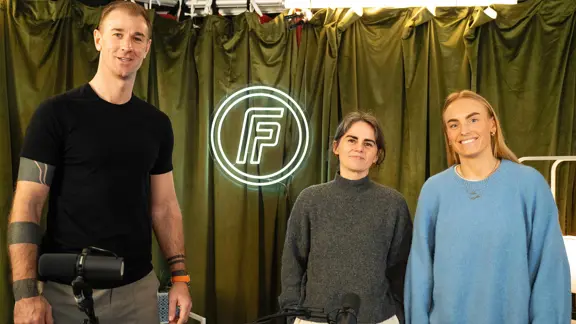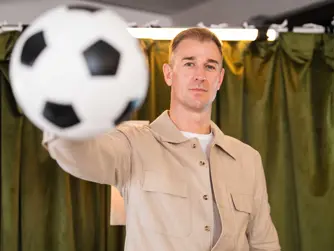News
Footballers Unfiltered: Football’s relationship with food

- Tottenham Hotspur defender Molly Bartrip is the latest guest on Footballers Unfiltered with Joe Hart, a series uncovering the rarely heard side of football
- Bartrip, 28, talks about battling anorexia during her teenage years after suffering an injury set-back when on England duty
- One in five women's players experienced disordered eating over a 12-month period, according to a survey of footballers participating in a FIFPRO-led study tracking their health
Football’s relationship with food is the focus of the latest episode of Footballers Unfiltered with Joe Hart, a series where men’s and women’s players speak frankly about important but little-discussed issues in professional football.
Last year FIFPRO revealed one in five women's players experienced disordered eating over a 12-month period, according to a survey of footballers participating in a study tracking their health.
Disordered eating is an unhealthy relationship with food which covers many behaviours such as restricting food intake and excessive exercising. Some thoughts, behaviours and attitudes will overlap with eating disorders, yet that term is reserved for those experiences which have received clinical diagnosis.
In the latest instalment of the Footballers Unfiltered series, Tottenham Hotspur defender Molly Bartrip talks about her battle with anorexia nervosa, depression and anxiety. It started at 14 years of age after an injury set-back when on international duty with England, at a time when she was playing for Arsenal’s youth sides.
"For some reason my mind just had a switch. I didn’t feel good enough. I had no control over England selection, Arsenal selection, but I had control of what I was putting in my body. I'm just not going to eat," says Bartrip.
"To other people it was maybe me just concentrating on getting fitter, looking better, but it got to the point where I got caught throwing food away at school. I didn't want to accept I was ill."
After her parents became concerned for her wellbeing and sought medical help, Bartrip was diagnosed with anorexia nervosa. "I went to hospital to get tube-fed. It made me realise I needed to sort myself out otherwise I'm not going to have a life, let alone be a footballer ever again."
Now 28, Bartrip has over 10 years' experience playing in England’s Women’s Super League, having represented Reading before moving to current club Spurs in July 2021.
"I still suffer from anxiety every day and it's tough. I fight with my brain all the time and it's a bit draining because I've done it since I was 14. I've had this fight that has been continuous. It's never really left me. I've accepted that side of me, but I don't want to have to fight every day."
Bartrip has credited the multi-disciplinary staff at her club, such as sport psychologists, in helping her cope with the condition.
"We put so much emphasis on injuries in football, but why do we not for the mental side of the game? I do think there's a long way to go, but we’re getting there.
"I'm so proud of Spurs because we have both a psychologist and a nutritionist, and the relationship the players have with them both is top."
Hart, a former Spurs goalkeeper, adds: "You have to feel safe in your club environment. If that’s where you feel safe, you can have conversations if you're struggling or if you need help with things. I think that's something I've seen really improve in the men's game."
Football’s 'fat clubs'
A former player with AZ Alkmaar, Everton, Leeds United and Liverpool, Dr Alex Culvin is FIFPRO’s Director of Global Policy and Strategic Relations for Women's Football. As part of her PHD research in 2019, Dr Culvin investigated the health effects on WSL players after England’s top-flight became professionalised and found evidence of fat shaming and eating disorders amongst players.
Speaking on Footballers Unfiltered, Dr Culvin describes it as an "endemic issue". She says: "Whether you're male or female, when you enter the system of football, food becomes a controlled substance that's used only for performance.
"It's not really talked about that much in the women's game. I think it's an endemic issue. A lot of players have an unhealthy relationship with food and don't recognise it as such because it's so normalised."
Footballers Unfiltered with Joe Hart: More Episodes

Speaking about her research, she says: "Everything that come back to me was around players and the treatment of the club. So, when players were returning a little bit overweight, they were put in this ‘fat club’.
"In the women's game, where we have this acceleration of professionalisation in some parts of the world, we can't forget the key components that enable players to perform and feel like they can thrive as a human being; nutrition, mental health support and psychologists are fundamental to resource the game properly and ensure we have players who feel supported."
Footballers Unfiltered is a monthly series celebrating FIFPRO’s 60th year of serving players. All episodes can be accessed HERE.



